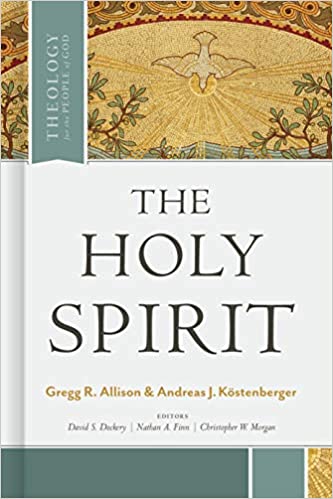A Book Review from Books At a Glance
by Mark Baker
The Holy Spirit is the inaugural volume in the new Theology for the People of God series. The series addresses individual topics of systematic theology (e.g., God, Man, Salvation) from the lens of a biblical scholar and a systematic scholar. Each co-authored work begins with a biblical theology of the given topic and concludes with a systematic treatment based on that biblical data. The end goal is to “emphasize integration of biblical and systematic theology in dialog with historical theology and with application to church and life” (xxii). I couldn’t think of two better authors to pen this inaugural volume than Gregg R. Allison (The Southern Baptist Theological Seminary) and Andreas J. Köstenberger (Midwestern Baptist Theological Seminary).
The biblical-theological treatment of the Holy Spirit takes a book-by-book (or section-by-section) approach that is primarily descriptive. Each section contains a clear analysis of the Holy Spirit in pertinent texts, often including helpful charts and summaries. When it comes to the activity of the Holy Spirit, the authors argue for both unity and diversity between the Old and New Testaments. The Spirit is at work in both testaments, but “the day of Pentecost marks a watershed with the outpouring of the Spirit on all believers” (202). Overall, the authors conclude that the Spirit works in six interrelated ways: The Spirit (1) mediates God’s presence; (2) imparts life; (3) reveals truth; (4) fosters holiness; (5) supplies power, and (6) effects unity (205).
The second half of the book analyzes the Holy Spirit from both a historical and a systematic lens, focusing on the relationship between the Holy Spirit and other key loci of systematic theology (e.g., Scripture, Christ, the Church). The authors draw attention to the language of “the outpouring of the Holy Spirit” as a central theme that serves to correct the “overintellectualization” of the Holy Spirit. The authors contend that the Holy Spirit is not bashful or deferential, nor can he be contained to our academic study.
Allison and Köstenberger present a compelling continuationist perspective, arguing that the gifts of the Spirit are still available for believers today, though they should be stewarded humbly and responsibly as directed by Scripture. The authors differ slightly on the identification of the sin of “blasphemy against the Holy Spirit,” but both agree that the sin is unpardonable “due to the callousness of the heart of the person who commits this sin” (345). I just have one minor complaint: the chapter on “The Holy Spirit and the Future” felt too brief, totaling just four pages.
I’ll say it unapologetically: I love this book! As far as pneumatology goes, its methodology is unrivaled. The descriptive biblical-theological section brings out the biblical data without the danger of imposing the categories of systematic theology onto the text. The historical-systematic section brings the biblical data to bear on contemporary issues and questions. The authors are academically rigorous and pastorally sensitive. They do not merely rehash old debates; they bring a fresh treatment to the topic that will provide a feast for the heart and mind. This book should be assigned in every college and seminary classroom that teaches on the Holy Spirit. Church leaders and educated laypeople will also be edified and encouraged to dive deeply into this excellent work.
Mark Baker (PhD, Southeastern Baptist Theological Seminary) serves as director of the Heart of Texas Foundation | College of Ministry, located in Houston, TX.
Copyright 2022, Books At a Glance
Books At a Glance book summaries are available by subscription only and except for brief quotes may not be reproduced, in whole or in part, without express, written permission.
Buy the books

THE HOLY SPIRIT (THEOLOGY FOR THE PEOPLE OF GOD), by Gregg R. Allison and Andreas J. Köstenberger